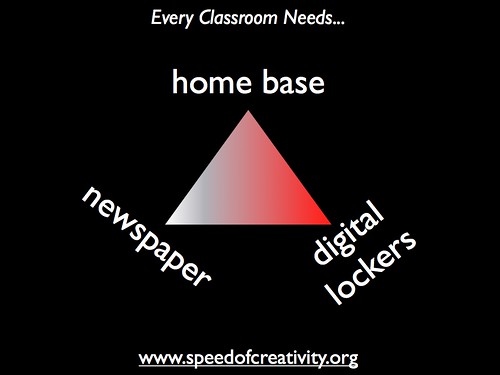As educators, we need to STOP locking up all our curriculum content behind logins and passwords. We need to stop following behind our institutions like compliant sheep when our leaders suggest things like, “You should put your entire course in BlackBoard / WebCT / Moodle / etc.”
In today’s webinar for eTechOhio, I argued that every classroom needs three digital spaces for sharing: a “home base” site (wiki), a newspaper (blog), and a “digital locker.” That digital locker is the space for sharing confidential information like student grades, taking quizzes and tests, etc. It’s NOT the space for creating and sharing digital curriculum. Those activities need to be done on the OPEN WEB, outside logins and passwords. Curriculum for the Technology 4 Teachers class I taught at UCO last spring is an example. Jim Askew’s amazing high school chemistry curriculum for students in Crescent, Oklahoma, is another. There are more examples, but there need to be MANY, MANY more. This kind of open curriculum sharing on the web needs to become the NORM, not the exception.
The 2008 Creative Commons video, “A Shared Culture,” makes a compelling case for why sharing content on the open web is so important. The contexts here go beyond education, but the education space specifically is vital for open sharing. This is an ethic we each need to embrace and advocate for. Take a few minutes and watch this video, then pass it on.
Hat tip to Maria Henderson for sharing the term “home base” in this context in a presentation in White Oak, Texas, this summer.
For more related to this topic, see my presentation resources for “The Road to Blended Learning.” Also don’t miss Dean Shareski’s opening keynote for the 2010 K-12 Online Conference, “Sharing: The Moral Imperative.”
Technorati Tags: blog, classroom, edtech, moodle, technology, wiki, needs, webct, blackboard
If you enjoyed this post and found it useful, subscribe to Wes’ free newsletter. Check out Wes’ video tutorial library, “Playing with Media.” Information about more ways to learn with Dr. Wesley Fryer are available on wesfryer.com/after.
On this day..
- Tips for Using Jamboard – 2022
- Provide Family Tech Support FREE with Teamviewer – 2020
- Teaching iPad Videography From 3800 Miles Away – 2014
- Copying the Textbook is NOT an Acceptable Assignment – 2012
- New Video Editing Options with YouTube’s Browser-based Editor and Magisto – 2011
- Radio Program for Playing with Media? – 2011
- World Expo Shanghai (a VoiceThread digital story) – 2010
- Create animated cartoon videos with GoAnimate #learning2cn – 2010
- Takeaways from the 21st Century Learning @ Hong Kong Conference – 2009
- New South Wales: The One to Watch as a Scaled 1:1 Deployment – 2009



Comments
6 responses to “Making the Case for Sharing Curriculum Openly Online [video]”
Mr. Shareski,
What a great, informative video that appeals to the educators who WANT a better society, a more INFORMED society, with intelligent, capable individuals at its helm. I am a student in John Strange’s class this semester, and have learned so much in just the month I have been participating. Thank you for soliciting in such a creative way the help and assistance of the network of practicing teachers and pre-service teachers to embrace the wonderful world of sharing and its endless benefits to education itself. The more I see about how densely we can all be connected and use/share each others’ creativity, the more excited I become to have my own classroom! You are an inspiring orator and educator!
Gretchen M. McPherson
EDM 310
University of South Alabama
[…] Now Even Better for Edu http://t.co/f1exhYlX < hangouts is prob best bit of google+, Moving at the Speed of Creativity – Making the Case for Sharing Curriculum Openly Online [vide… Making the Case for Sharing Curriculum Openly Online [video] […]
I would add another category, though. Moodle and other LMSes have their place, too., as places for students to work out with each other and the teacher their learning before they share with the wider world.
Right, I agree the LMS has it’s place… that’s the “virtual locker” or “digital locker” corner of the triangle.
Wes, I’d be interested in hearing how you think this open model would work in the online learning market which is becoming increasingly competitive and proprietary in regards to digital curriculum. Online courses are the new textbook. The cost of developing such courses is extremely high (~$100,000 for a full year course). Few companies/districts are willing to open sources such projects.
When I first started teaching 15 years ago, many teachers didn’t want to share their syllabi and course assignments from their traditional face-to-face courses (the internet wasn’t what it is now). This generation of educators I think are more open to the idea of sharing curriculum in an open web environment because it is more comfortable with the “sharing” world of the internet. Social media has changed the way educators view many concepts. We network with one another, promote our books and conferences, so it’s only fitting that we should be willing to share our curriculum in an open way as well. Great post!